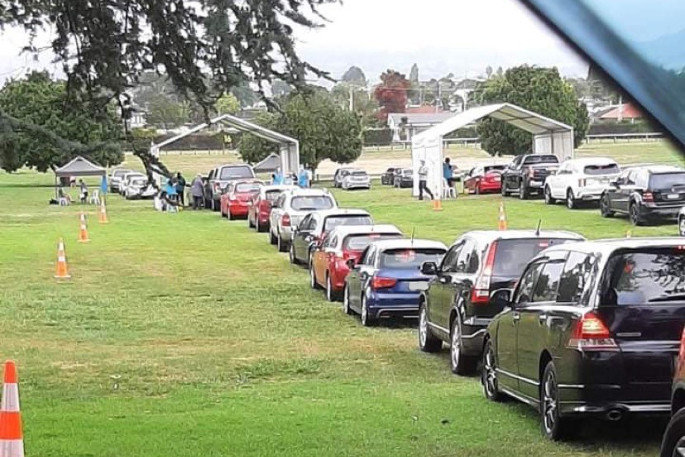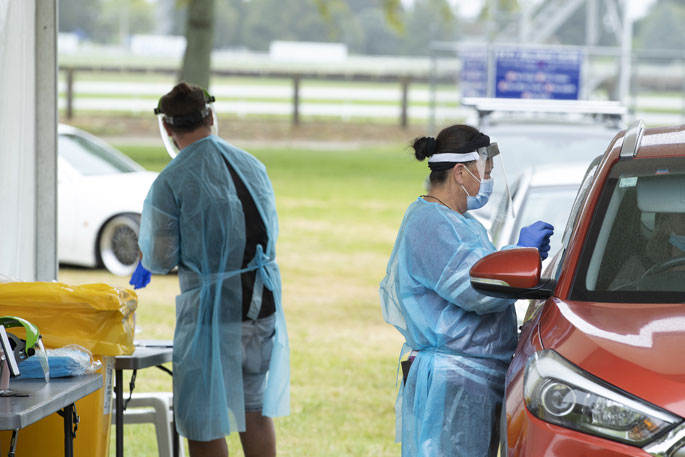A Covid-19 modeller says the people who get infected Covid-19 this long weekend may not show up on the case tally for another two weeks.
Professor Michael Plank says it could take several days to develop symptoms, a couple of days for someone to get a test, then another couple of days for the results to come back.
"Whatever number of infections we do get on Waitangi Day, that won't be reflected in the case numbers for another two weeks yet," says Plank.
There were 209 new community cases announced on Friday, while at the start of the week the numbers hovered around 100 cases a day.
Plank says cases could double next week, if the current trend continued.
"It looks like cases are doubling about every four to five days and we're likely to hit 400 cases sometime around the middle of next week if that trend continues," he says.
Meanwhile, communities around the country are gearing up to increase vaccination rates and support people with Covid-19.
The Waikato DHB was setting up community hubs across its rohe to help iwi care for whānau who get Covid-19.
The region saw a sharp rise in case numbers yesterday - jumping from 15 to 51.
The DHB's Covid-19 director Maree Munro says iwi required local support, instead of it coming from regional or national groups.
"In a lot of our areas we've got iwi leadership setting up to put in place community hubs that will be the link between the healthcare providers and a lot of the other agencies in the community, to support whānau who are self isolating at home," she says.
The first hub started in December in Ruapehu, and now there are another nine others across the Waikato in various stages of training.
They will start operating in the next couple of weeks.

The drive-thru vaccination centre at Tauranga Racecourse is open from 10am -3.30pm on Waitangi Weekend Monday. Photo: Kate Burrell.
In Bay of Plenty, health officials are aiming to raise Covid-19 vaccination rates in the district over the Waitangi holiday weekend.
Drive-through vaccination events are being held at the Tauranga Racecourse and the Whakatāne War Memorial car park on Monday february 7 from 10am - 3.30pm.
DHB spokesperson Brent Gilbert-De Rios says adults could get first, second and booster shots and children aged five and over could be vaccinated at the same time.
He says drive-through venues proved to be popular during last year's vaccination rollout and were a comfortable way for families to get vaccinated together.
The Bay of Plenty DHB has the second lowest vaccination rate for Māori, behind Northland, at 81 per cent.
In Taranaki, police say they were called out 20 times to locations where Covid-19 vaccinations were being administered in the last three months of last year, making one arrest.
Last year, the Taranaki District Health Board began alerting police to when vaccination clinics were being held following harrassment from anti-vaxxers.
In response to an Official Information Act request, police say between September 18 and December 18 they responded to 13 callouts in New Plymouth, two in Westown and six in Bell Block.
The arrest was made in Westown.
Police say call outs included to pharmacies, medical centres and temporary clinics.
Anti-vaccination protestors have also been active in the wider Whanganui region.
It was reported earlier this week that Māori health providers in the region were holding back on Covid-19 vaccinations for children amid growing protests.
The area has recorded the second-lowest rate in the country of vaccinations for children aged 5 to 11 years.
Iwi collective Te Ranga Tupua says one of its mobile vaccination clinics was egged in the Whanganui suburb of Aramoho on Wednesday and anti-vaxxer activity had been ramping up since children became eligible for vaccination.



0 comments
Leave a Comment
You must be logged in to make a comment.